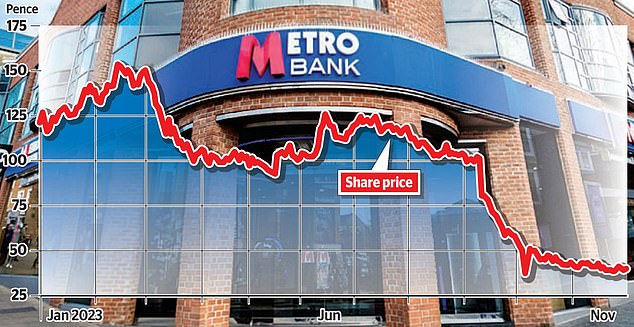Metro Bank planning to slash 850 jobs and cut opening hours in bid to avoid collapse
Metro Bank plans to cut branch opening hours and cut hundreds of jobs as part of proposals to save the company from collapse.
The lender said it will lay off 20 percent of its 4,266-strong workforce, meaning more than 850 jobs will be lost.
The move to reduce opening hours is a blow to customers as the bank's seven-day-a-week operation was one of its selling points when Metro opened its doors in 2010.
It had tried to capitalize on public anger over the closure of major branches by mainstream banks since the 2008 financial crisis by focusing solely on branch services.
Part of the strategy was to help bank customers avoid the 'lunch time rush' by being open between 8am and 8pm every day of the week.
Job losses: Metro Bank said it will lay off 20% of its 4,266-strong workforce, meaning more than 850 jobs will be lost
Analysts believe the bank is likely to shorten its opening hours this weekend.
Metro added that the measures were part of plans to cut costs by £50 million a year. This is higher than the previously announced target of £30 million.
This week Metro received shareholder approval for a £925m refinancing plan and is in talks to sell a £3bn mortgage portfolio.
On a disastrous day for British high street banking, Lloyds announced it will close 45 branches.
And NatWest has warned that more cuts are coming after it said last week it would close 19 locations.
Thousands of branches have closed in recent years and more than 500 will close in 2023 as customers switch to online banking.
But the cuts are hitting elderly and vulnerable people, and small businesses that need easy access to cash.
Metro Bank says it is in discussions with the financial watchdog, the Financial Conduct Authority, about the effect shortening opening hours would have.
The lender has approximately 2.7 million customers and 75 branches in Great Britain.
Metro Bank said it remains 'committed to retail and the High Street' and still plans to open around 11 new locations by the end of 2025, mainly in northern England.

Metro this week won shareholder approval for a £925m refinancing plan and is in talks to sell a £3bn mortgage portfolio
Most branches are in and around London, but the lender is looking to expand to other cities, including Exeter, Norwich and Nottingham.
But it will 'move to a more cost-efficient business model', automating some services and back-office tasks and improving digital services.
“The company is reviewing seven-day opening hours and extended shopping hours across its store network and is in discussions with the Financial Conduct Authority about the customer implications of such changes,” the company said.
The bank confirmed yesterday that it had completed a £150 million share placement, which was a core part of the rescue package secured in October.
More than 90 percent of shareholders voted in favor of approving the deal this week.
Billionaire Jaime Gilinski Bacal, from Colombia, will become the bank's controlling shareholder after the placement.
His Spaldy Investments will inject £102 million into the lender, increasing its stake from 9 percent to 53 percent.
Metro had indicated in October that it was in trouble after a series of blunders in recent years.
These included accounting errors, leadership departures and delayed regulatory approvals for major capital relief plans.
Last month it revealed it needed hundreds of millions of pounds to shore up its balance sheet and needed to refinance £350 million of debt within a year.
Metro chief executive Daniel Frumkin said: 'The support of our investors through this transaction will enable Metro Bank to accelerate its growth plans with the new capital, allowing us to unlock the potential in the business and deliver sustainable profitable returns as we strive to be the leading factor. number one community bank.”
